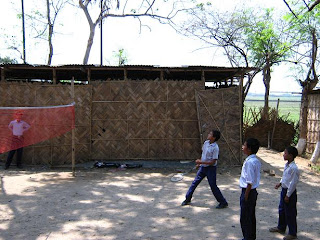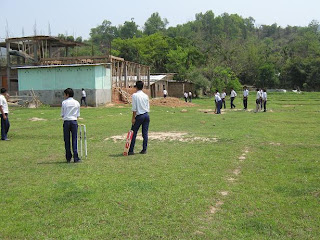Story by Teresa Rehman
Editor, The Thumb Print
http://www.thethumbprintmag.com/


Editor, The Thumb Print
http://www.thethumbprintmag.com/
ON THE MARGINS
The Thumb Print, volume:1, issue:1, june 2012
With love from Assam village: Techno connect to world
A cyber-savvy tribal school teacher uses technology, to expose underprivileged children to the world outside. The Thumb Print delves into the mission of this unique teacher.
It was the year 2005. A perplexed teacher running a school for underprivileged children in a remote village in the Indian state of Assam, came to the nearest city Guwahati. He wanted to learn more about the 'monster' called the internet. He went to a cyber cafe and asked the person at the counter to teach him the basics of internet use - composing and sending emails. The person told him, "It's very simple. But I will charge Rs 20 per hour for the lesson." So, that one hour was a crucial period for the visionary teacher who had a desire to connect to the outside world.
He had first realized the importance of the internet when he wanted to connect to the outside world. "People wanted to talk to us and see us talk to us through video-conferencing. Internet was something very remote and new for us. We did not even have a telephone connection. I had seen a computer and touched the keyboard but never got an opportunity to switch it on," he says.
Now, knowledge of the internet and the laptop equipped with a webcam gifted by a well-wisher is a boon for Teron and his students from adjoining villages. Parijat Academy, school for children from economically backward families in Pamohi village in Assam now regularly interact with Non-resident Indians as well as foreigners who are interested in their school through skype. Parijat (meaning "heavenly flower") Academy is a school set up by Teron to engage children from inaccessible villages in education. Children from nine tribal villages namely Pamohi, Mahguapra, Deosutal, Garchuk, Mainakhorong, Dhalbama, Nowagaon, Garoghuli and Garbhanga study in the school.
Teron was already working with the Guwahati Zilla Moina Parijat, a local group working with children, giving them training in leadership, music, physical education. He started the school in 2003 in a cow shed with just four children with a pair of desk and benches. Teron had saved Rs 800 from the fees he received after giving tuition to a few students outside his village. With this amount, he got a pair of desks and benches made by a village carpenter. The school was ready to enroll students from nursery to Class III. Teron had a tough time convincing parents to send their kids to school. Teron says, "I felt the need to educate these children, especially girls who were being sent to work by their parents as child labourers from a very tender age."
Today, the school, with a small hostel, provides free education to more than 500 students across ages, of which 50 percent are girls. He does have a tough time paying his five teachers as he is dependent on donations from well-wishers. "I pay my teachers whenever I have money. The rest of the time, they bear with me. I don't know how to thank them," he said. Teron is also concerned about the health of the children. "We need milk for the malnourished students, medical check-ups and treatment for kids suffering from various diseases like tuberculosis, skin diseases and jaundice," he says.
Teron's mantra of success was networking with the world. He says, "I know that we are in a remote place. The only way I can sustain my school is to build a network of well-wishers. And that is possible through the wonder called the internet." He adds that it is not only financial support but sharing of ideas and suggestions which can help us grow. They also have a website which is maintained by a well-wisher based in the USA and a facebook page which helps them to connect with the unknown people all over the world.
When they had their first interaction on skype, his students watched awestruck. Sankar Bongjang, 15 sat glued to the screen of the laptop in front of him. He was intrigued by the thought that he was actually talking to a group of people in some faraway land on that laptop screen. Initially he thought it was a movie going on but then realized that his teacher Teron was actually talking to people on the screen.
Recently, they had a chat with University students in Australia. The kids interacted with students from Flinders University, Adelaide South Australia. They had discussed a whole range of issues from sustainable livelihood lifestyles of tribal communities, importance of forest-based resources in their lives and also the importance of school education.
Teron's initiative came to the notice of Udoy Saikia from the School of the Environment, Flinders University, South Australia who started working with Teron and his team through an organisation called SASCWA (South Australians Supporting Children and Women in Assam - www.sascwa.org). As a first step, Teron got invited to deliver a guest lecture to the students at Flinders University on the sustainable livelihood of the Karbi tribe in his locality. Teron discussed these issues for an hour with the postgraduate students through Skype online chat. There was a group of around 20 postgraduate students representing nine different countries worldwide participated in this discussion.
Internet has acted as a bridge which connects them with the outside world. Many volunteers from abroad come and work with them. For instance, Amy Partridge, a resident of Georgia in the USA had spent time with these underprivileged children to teach them to communicate in English.
Amy has worked in various schools and non-profit organizations in various countries like in Korea and Hungary as a volunteer educator of English. And not surprisingly, the children have learnt to rattle off English alphabets and simple sentences with an American accent. Teron says, "When foreigners first came to my school, my students kept away from them. They were too scared to even go near them. But now, they are very confident and keep them engaged in various activities."
Partridge came to Parijat Academy after completing a teaching job in South Korea for two years. She writes, "The education system is extremely different from India. In Korea children are overwhelmed with education and in India children are thirsty for it. The kids here are eager to learn and they are very excited to have a foreigner in the classroom. The energy level is very high and seeing the glow in their eyes is one of the greatest feelings I've ever experienced. The English level is very low, so sometimes it can be discouraging, but yesterday I started to notice that some of the children were starting to catch on and I could hear them using simple phrases that I commonly use...phrases such as, "high five", "excellent," "fantastic," "Are you ready?," "Is it okay?". After noticing this, I started to feel more hope. Also, they have pretty much mastered the "Hokie Pokie" and I have a blast every time I lead them in the song/dance."
In fact, whoever came and interacted with these children are touched by their warmth and of their mentor Teron. Dhaujee Kelly, 19 year old student of Psychology and Sociology at Bowdoin College in Brunswick, Maine wrote poignant pieces on her experience at Parijat Academy in her blog. She writes, "My last days at the Academy were some of the hardest. I did not want to deal with the reality of leaving. I surprised the hostel children and the family that took me in as their own. I made and gifted them all with friendship bracelets, because they were like family, friends, and students all in one. They made my time there comforting and enjoyable. My last night there, there was no electricity, so I sat in a circle with the children and we all shared songs, they laughed and asked me again and again to sing at least two American songs and I felt so shy around them, but it all was a good time. It is unexplainable how much I will miss them."
Keen to explore the world around him, Teron had even participated in a 80 km Gandhi Peace Walk in 2008 in Brisbane, Australia. He was sponsored by Garvin Brown, a Gandhian from Australia. Now, he is holding online talks with the Assam Foundation of North America to set up a solar lighting project in some of the forest villages.
With modern communication technology, the world has come closer to these little children. With support from different parts of the world, hopefully the dreams of many of the underprivileged children will come true. And hopefully still, more children will dare to dream outside of their little worlds.
All comments may be sent to feedback@thethumbprintmag.com
Teresa Rehman
Editor
The Thumb Print
(A contemporary news magazine)
Website: www.thethumbprintmag.com
Email: editor@thethumbprintmag.com
ph: +91-9954096800
Editor
The Thumb Print
(A contemporary news magazine)
Website: www.thethumbprintmag.com
Email: editor@thethumbprintmag.com
ph: +91-9954096800




























